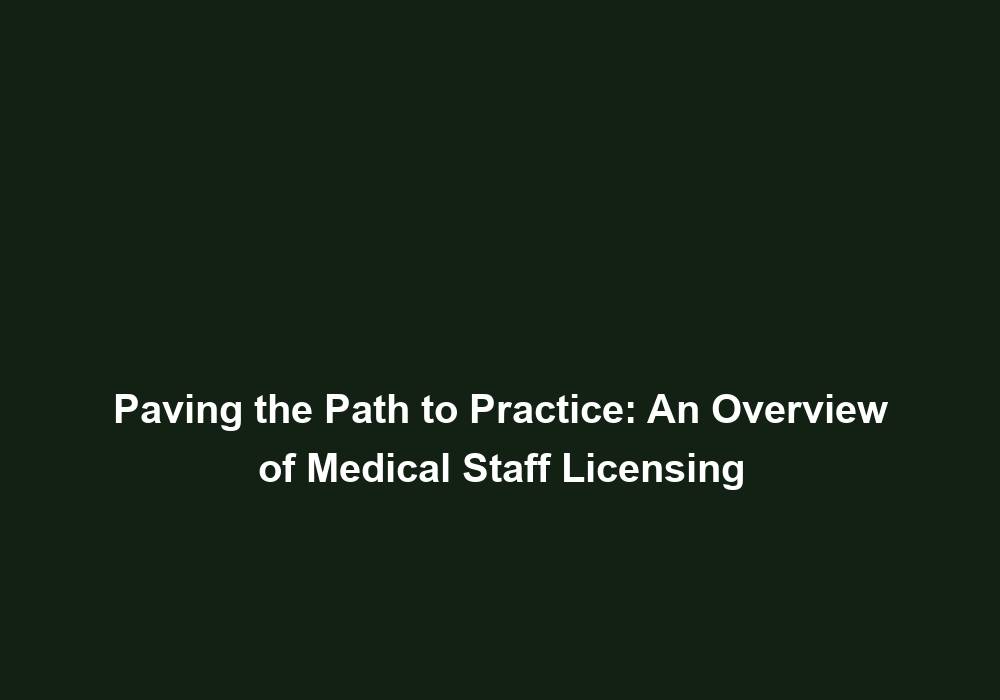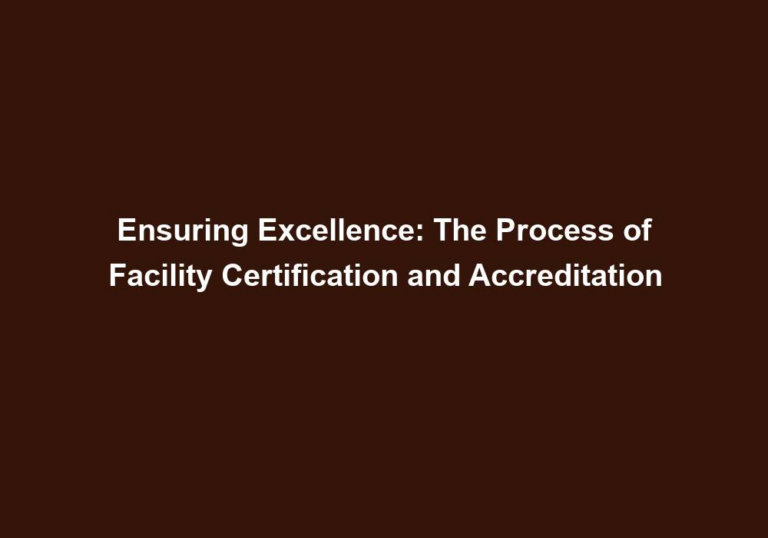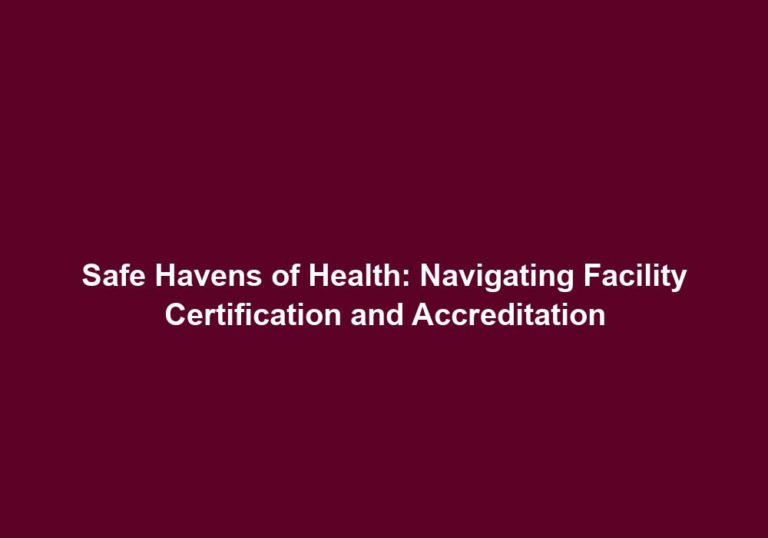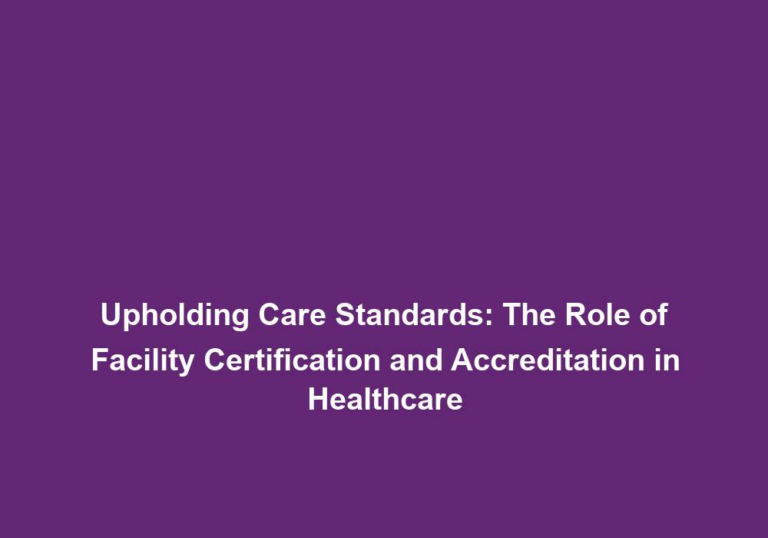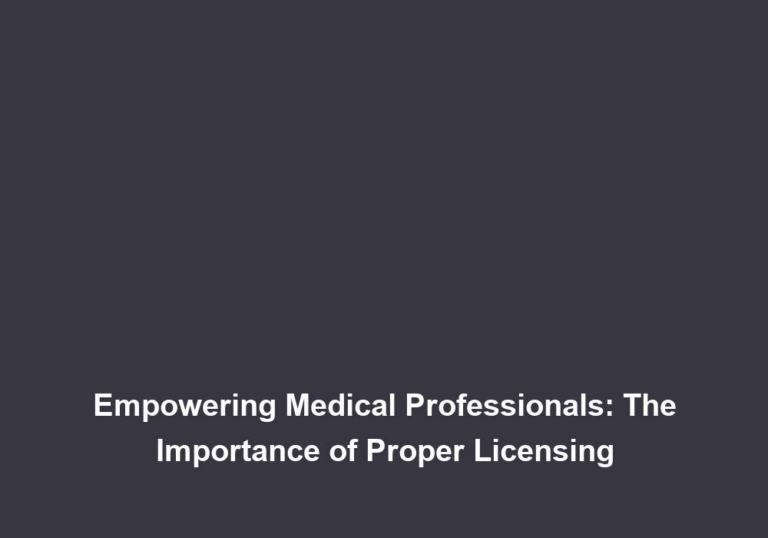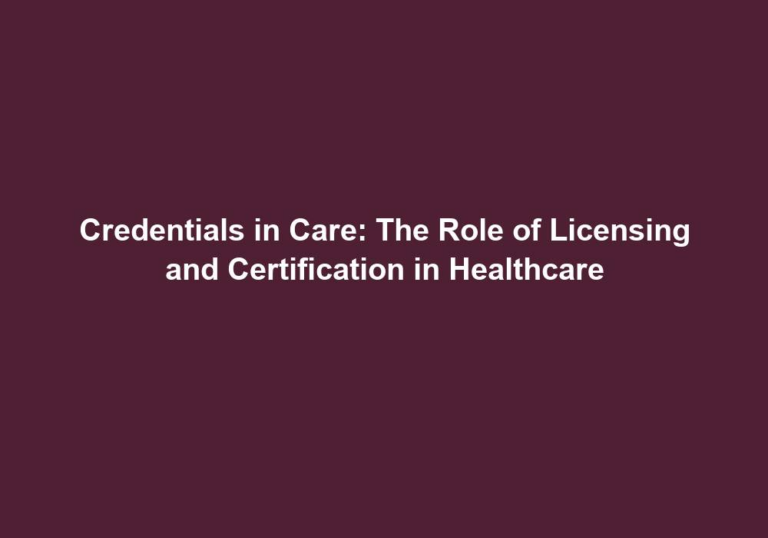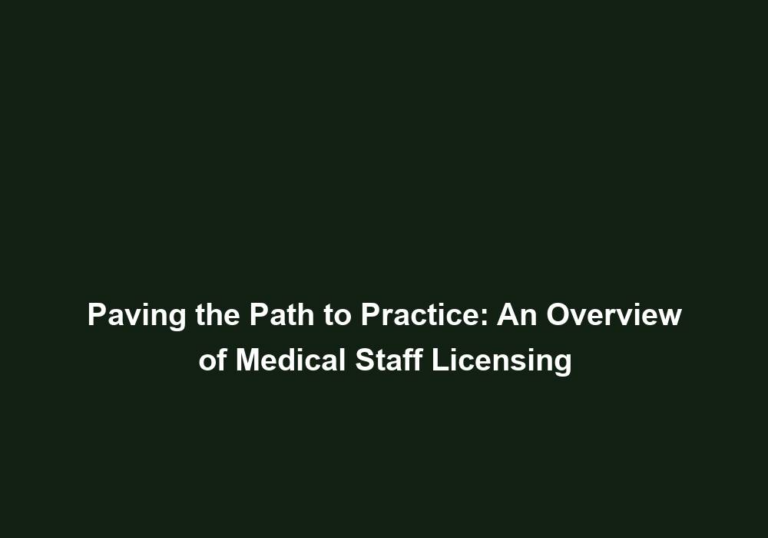Paving the Path to Practice: An Overview of Medical Staff Licensing
The field of healthcare is highly regulated to ensure the safety and well-being of patients. One critical aspect of this regulation is medical staff licensing. Medical professionals, such as doctors, nurses, and allied health professionals, must go through a rigorous process to obtain their license before they can legally practice their profession. In this article, we will provide you with an in-depth overview of medical staff licensing, highlighting the key steps and requirements involved.
Understanding Medical Staff Licensing
Medical staff licensing refers to the process of obtaining legal permission to practice medicine or provide healthcare services. It is a crucial step for healthcare professionals as it ensures that they meet the required standards and possess the necessary skills and knowledge to provide high-quality care to patients.
When pursuing medical staff licensing, it is important to understand that the requirements and procedures may vary depending on the country and jurisdiction. However, the fundamental objective remains the same: to ensure that healthcare professionals are competent and capable of delivering safe and effective care.
The Importance of Medical Staff Licensing
Licensing is essential to safeguard the public and maintain the integrity of the healthcare system. It serves several key purposes:
-
Patient protection: Licensing ensures that healthcare professionals have the necessary qualifications and skills to provide safe and effective care to patients. It acts as a guarantee that the individual has met the required standards of competency and professionalism.
-
Professional accountability: Licensing provides a framework for holding healthcare professionals accountable for their actions. It establishes a set of ethical standards and guidelines that professionals must adhere to, promoting responsible and ethical practice.
-
Quality assurance: Licensing boards and regulatory bodies set standards for education, training, and continuing professional development. These standards help ensure that healthcare professionals stay updated with the latest advancements in their field, promoting quality and evidence-based care.
Patient Protection:
- Licensing is a crucial mechanism for ensuring the safety of patients. By requiring healthcare professionals to meet specific qualifications and competencies, licensing boards help protect patients from receiving substandard care.
- Licensing ensures that healthcare professionals have undergone the necessary education and training to diagnose and treat patients effectively. It verifies that they have obtained the required knowledge and skills to provide safe and appropriate care.
- By setting standards of competency, licensing boards help prevent individuals who are unqualified or inadequately trained from practicing medicine or providing healthcare services.
Professional Accountability:
- Licensing establishes a framework of rules and regulations that healthcare professionals must abide by. These regulations ensure that professionals conduct themselves ethically and responsibly in their practice.
- By holding healthcare professionals accountable for their actions, licensing helps maintain public trust in the healthcare system. It ensures that professionals adhere to a code of conduct and provide care that aligns with professional standards and ethical guidelines.
- Licensing also provides a mechanism for patients to file complaints or seek recourse if they believe they have received substandard care. It allows licensing boards to investigate and take appropriate action against professionals who violate regulations or fail to meet the required standards.
Quality Assurance:
- Licensing boards and regulatory bodies set standards for the education, training, and continuing professional development of healthcare professionals. These standards help ensure that professionals stay up-to-date with advancements in their field and provide evidence-based care.
- Through licensing, healthcare professionals are encouraged to engage in ongoing education and professional development activities. This ensures that they remain competent and capable of delivering the highest quality of care throughout their careers.
- Licensing boards may require professionals to regularly renew their licenses, providing an opportunity to assess their ongoing competence and commitment to professional development.
The Process of Medical Staff Licensing
While the specific requirements for medical staff licensing may vary depending on the country and jurisdiction, there are some common steps involved in the process:
- Education and Training: The foundation of medical staff licensing begins with obtaining the necessary education and training. This typically involves completing a recognized medical or healthcare program from an accredited institution. The duration and content of these programs may vary depending on the profession.
Education and Training:
- To pursue a career in healthcare, individuals must first acquire the appropriate education and training. This typically involves completing a bachelor’s degree in a relevant field, followed by further specialized education in their chosen profession.
- Medical doctors, for example, must complete a Doctor of Medicine (MD) or Doctor of Osteopathic Medicine (DO) degree. Nurses may pursue a Bachelor of Science in Nursing (BSN) or an Associate Degree in Nursing (ADN), while allied health professionals may pursue degrees specific to their field, such as a Bachelor of Occupational Therapy or Bachelor of Physical Therapy.
- These educational programs provide students with a foundational understanding of medical science, anatomy, physiology, pharmacology, and other relevant subjects. They also include hands-on clinical experiences to develop practical skills.
Clinical Experience:
- In addition to formal education, healthcare professionals often need to gain practical experience in their field. This may involve completing internships, residencies, or clinical rotations in approved healthcare settings. These experiences provide hands-on training and allow individuals to apply their theoretical knowledge in real-life scenarios.
- Clinical experiences vary depending on the profession. For example, medical doctors must complete several years of residency training in a specific specialty, while nurses may participate in clinical rotations in various healthcare settings under the supervision of experienced professionals.
- These practical experiences help healthcare professionals develop essential skills, such as patient care, critical thinking, decision-making, and effective communication.
Licensing Examinations:
- Once the educational and clinical requirements are met, healthcare professionals must pass licensing examinations. These exams assess the individual’s knowledge and competency in their specific field of practice. Examples include the United States Medical Licensing Examination (USMLE) for physicians and the National Council Licensure Examination (NCLEX) for nurses.
- Licensing examinations typically consist of multiple-choice questions, practical assessments, and simulated patient scenarios. They evaluate the professional’s ability to apply their knowledge and skills in real-life situations and ensure that they meet the required standards of competence.
- These examinations may be administered by licensing boards or other authorized organizations. They are designed to assess the professional’s readiness to provide safe and effective care to patients.
Background Checks and References:
- To ensure the safety of patients, licensing boards often conduct background checks on applicants. This may include verifying educational credentials, checking for any disciplinary actions, and obtaining references from supervisors or colleagues.
- Background checks help licensing boards assess the applicant’s character, integrity, and fitness to practice. They aim to identify any past misconduct, criminal history, or ethical violations that may pose a risk to patients or the healthcare system.
- References from supervisors or colleagues provide additional insight into the applicant’s professional conduct, skill level, and ability to work effectively as part of a healthcare team.
Application and Fees:
- After meeting all the prerequisites, healthcare professionals must submit an application to the respective licensing board or regulatory body. The application typically includes personal information, educational history, clinical experience details, and any supporting documents. There is usually a fee associated with the application process.
- The application serves as a formal request for the medical staff license. It requires individuals to provide comprehensive information about their qualifications, experience, and background. This ensures that licensing boards have all the necessary information to make an informed decision regarding the applicant’s eligibility.
- The associated fee covers the administrative costs of processing the application and conducting the necessary reviews and evaluations. It helps support the operations of the licensing board and ensures the timely processing of applications.
License Issuance:
- Once the application is reviewed and approved, the licensing board will issue the medical staff license. This license grants the individual legal permission to practice their profession within the designated jurisdiction.
- The license serves as proof that the healthcare professional has met all the necessary requirements and has been deemed competent and qualified to provide healthcare services. It typically includes the individual’s name, license number, and any relevant restrictions or limitations.
- The license must be prominently displayed or readily available for verification in the healthcare professional’s place of practice. It is subject to renewal at specified intervals, with the healthcare professional required to demonstrate ongoing competence and adherence to professional standards.
Continuing Professional Development:
- Medical staff licensing is not a one-time event. Healthcare professionals are often required to engage in ongoing education and professional development activities to maintain their license. This may involve attending conferences, workshops, or completing continuing education courses.
- Continuing professional development ensures that healthcare professionals stay up-to-date with advancements in their field, new treatment modalities, and emerging research. It allows them to enhance their knowledge and skills, leading to improved patient care outcomes.
- Licensing boards may require professionals to accumulate a certain number of continuing education credits within a specified timeframe. These credits can be earned through various educational activities, such as attending conferences, participating in webinars, publishing research, or completing online courses.
- By actively engaging in continuing professional development, healthcare professionals demonstrate their commitment to lifelong learning and their dedication to providing high-quality care.
Conclusion
Medical staff licensing is a crucial step in the journey of healthcare professionals. It ensures that individuals possess the necessary qualifications, knowledge, and skills to provide safe and effective care to patients. The process involves education, training, examinations, background checks, and ongoing professional development. By upholding high standards and promoting accountability, medical staff licensing plays a vital role in maintaining the integrity of the healthcare system and protecting the well-being of patients.

